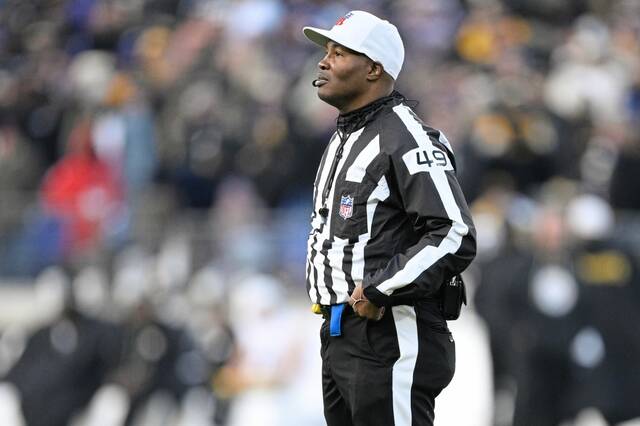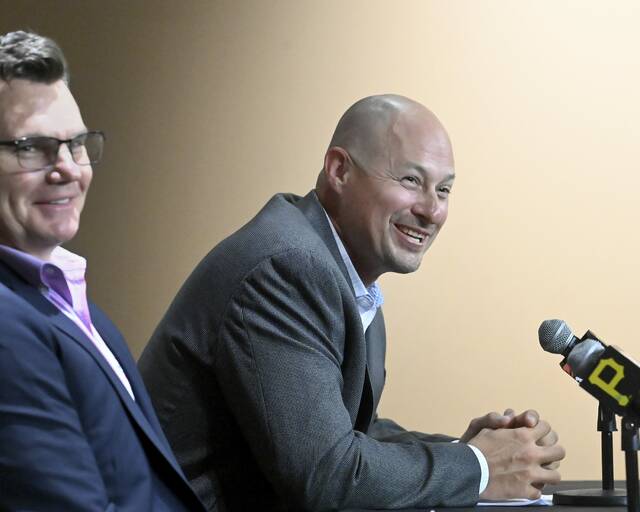The Pittsburgh Pirates were the first Major League Baseball team eliminated from postseason contention this year. For fans of the team, this wasn’t surprising.
For years, the Pirates have been stuck in the cycle of lose-rebuild-lose. But that cycle, and a record filled with few wins, has made it frustrating for fans, said Mike Lewis, a professor of marketing at Emory University who runs the podcast “Fanalytics With Mike Lewis.”
“It’s devastating in the long term, especially if you miss,” Lewis said.
Going for 10 or 15 or 20 years without winning is “incredibly demoralizing for the fan base.”
The Pirates, though, are an interesting case study, he said, because they are a team with a legacy — with beloved players such as Roberto Clemente, Willie Stargell, Bill Mazeroski and Dave Parker. That legacy, and a unique relationship that has developed between Pittsburgh sports teams and fans, means a core fan base likely will always remain.
“I think just because people might be unhappy that the team’s not doing well doesn’t mean they don’t care,” said Gabby Yearwood, director of undergraduate studies in the department of anthropology at the University of Pittsburgh. “They want the team to do well because then it generates some sort of pride in the community.”
According to Yearwood, the team’s fan base stems from the early history of baseball when players also were members of the community, meaning the team became a representation of the community itself. That sentiment remained, Yearwood said, as sports became professional and players were recruited from around the world.
“Each team represents a particular community, and the fans see themselves in the team, and the team is a representation of them and who they are,” he said.
What fans tend to forget, however, is that the game is a workplace for players, Yearwood said.
“I think fans sometimes forget that, and they mistakenly think of the sport as this idyllic place where they’re going to play a game, and it’s not a game for them,” he said. “It’s their livelihood. Their families and their communities are relying on the success of their team.”
But that success could suffer if there is a disconnect between coworkers or management, just as in other workplaces. The difference with sports teams is that everything is made public without the understanding that not everyone’s going to get along, Yearwood said.
“You’re being paid to perform a duty, and you have to do that no matter how you get along with anybody,” Yearwood said. “Obviously, if you’re in conflict with your peers or supervisors, it’s not surprising that people wouldn’t perform well.”
Sense of identity
For fans, though, years of supporting the Pirates has led to local families seeing the team as part of their identity, said Eric Bean, executive board member at Association for Applied Sports Psychology and a certified mental performance consultant based in San Diego.
“If I’m from Pittsburgh, my family’s from Pittsburgh, my grandpa’s grandpa’s grandpa has been a fan of the Pirates, now it’s kind of hard because it’s part of my identity,” Bean said. “It’s part of who I am and who we are as a family, that we’re Pirates fans.”
While the strength of that identity might fluctuate depending on how the team is performing, that underlying identity is likely to remain, Bean said, noting that winning and losing are not the only reasons fans associate with a team.
According to Bean, sports teams often give fans a sense of belonging by being something they can identify with, something that is seen through how a fan talks about a team, saying, “We won,” or “Oh, Pittsburgh lost.”
“The identity will still be there underneath even though they’ll try to separate themselves in how they communicate wins and losses,” he said. “One of the things about winning and losing and the fans’ loyalty is, typically, it does go beyond winning and losing partially because identification is about how we see ourselves and that doesn’t easily change.”
According to Lewis, there is a continuum of sports fans: from the most hardcore, who watch for the love of the game even if a team is awful, to those of casual interest who want to keep up with pop culture.
In the middle are those who follow a team when there is quality play on the field.
“A lot of sports fandom is about the role (teams) play in our communities and in our culture,” Lewis said. “When a team is winning, people jump on because of culture.”
Typically, office workers might gather around the morning after a big game to talk about it or gather at a bar after work to watch.
Society has been forced by the pandemic to shift away from those traditions, Lewis said.
He wonders, in the era of covid-19 and social justice movements, what will become of the sports fan.
“It’s a time of transition and upheaval,” Lewis said.








